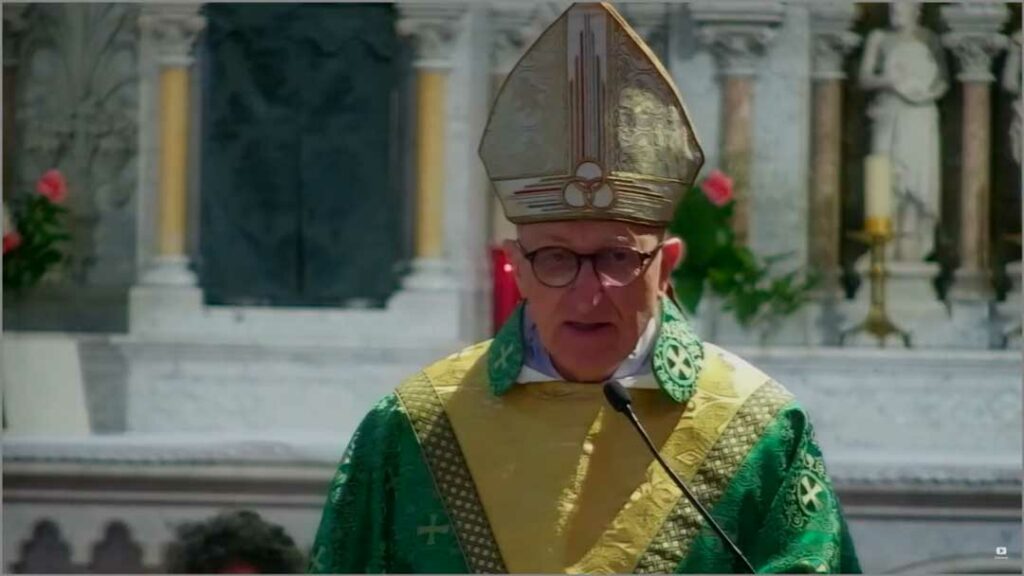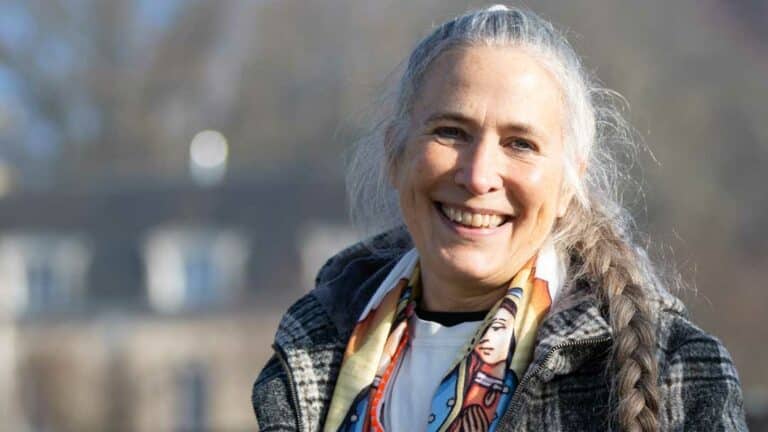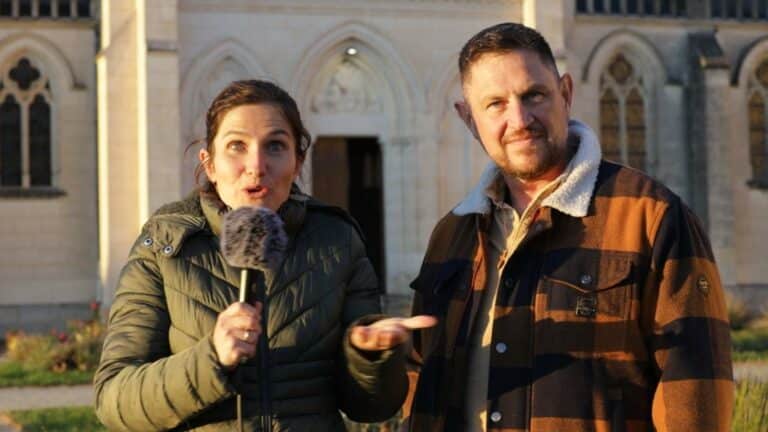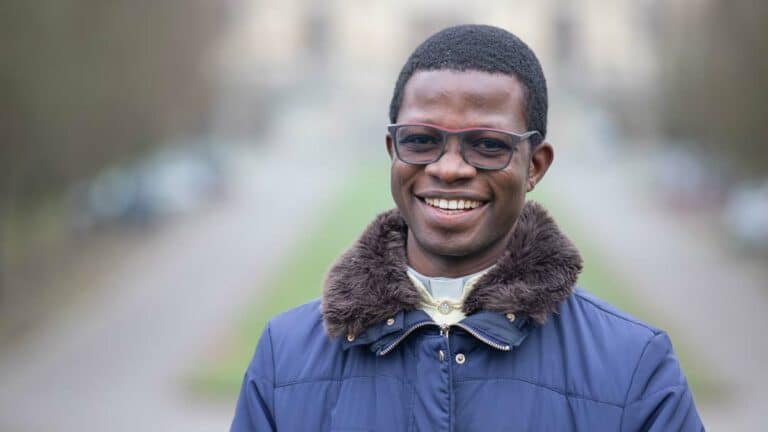During the pilgrimage of fathers to Montligeon on July 6, 2025, the French bishop Dominique Rey invited participants to meditate on their march of faith as a journey of conversion, humility and perseverance. Braving fears and threats, resisting the easy way out, not giving in to fatalism or to passivity, or to rushing forward, such is the theme of this year’s pilgrimage, encapsulated in the phrase “Have trust, God is calling you”.
“During this pilgrimage to Montligeon, as you travelled the roads and paths in the sometimes sweltering heat, you mobilized your bodies to withstand fatigue and prayed to offer God your joys and trials. You entrusted to the Lord the past, often a hindrance, the present that we sometimes find difficult to accept and assume, and the future that can slip away or grow darker.
Faith reaches us from the bottom to the top. From the bottom, that is, from our personal roots, i.e. from the day of our baptism.
Faith is also expressed through the top, as a call to surpass ourselves. A pilgrimage is an opportunity to rediscover an ideal, a new lease of life. With all our energy absorbed by the narcissistic quest for comfort or our daily routines, we find it hard to give intensity, or density, to our lives, to breathe the pure air of the summits. Our souls vegetate, carried away by the whirlwind of action, engrossed in superficiality. So often they lie dormant.
Christ comes to meet us, to give us access to our heavenly home. He leads us, day after day, along the steep, craggy path (sometimes the Way of the Cross) that leads us to God.
The path to God is discovered by humbly following Christ. It is a journey made up of reversals as well as changes of course. For example, at God’s call, St. Joseph fled in a hurry to Egypt with the Holy Family. He then returned to Israel at the behest of the angel Gabriel, and went back to Bethlehem to take the census. Here he is again, on the road to Jerusalem for Jesus’ presentation in the Temple at the time of his circumcision. He’ll be back for Jesus’ finding in the Temple.
Joseph is always on the go, which positions him in the wake of all those pilgrims who have marked the history of salvation: from Adam’s exile, thrown out of the Garden of Eden; to Abraham, who leaves his country and his kin to head for an unknown land; to Moses, who leads the Hebrew people on a 40-year exodus in the desert. The pilgrimage is also the prototype and a reflection of our own journey, the Church’s journey with and towards the Lord, a journey that is also for us, following Christ, an ascent towards the Heavenly Jerusalem.
Pilgrimage means leaning on soils that are only temporary, and constantly moving beyond them, since they are but springboards, runways, not dwellings. Putting your foot down everywhere, resting nowhere. I have the Transfiguration story in mind, when Peter wished he could set for ever the presence of Jesus in glory, suggesting to Jesus: ‘Let’s put up three tents here.’ The Gospels then dryly note: ‘He did not know what he was saying‘ (Lk 9:33).
Faith implies being in motion. As soon as it stops, or as soon as it withdraws, It gets perverted, like a river that turns into a swamp as soon as it stagnates.
The tragedy of all idolatry lies in the error consisting in freezing God’s presence in order to escape the uncertainty of tomorrow and the forward-looking tension to which life invites us. Our temptation then is to lock the image of God in sacred objects, subjective impressions, in order to to capture it. As the Hebrews in the desert did when they wanted to represent God, whose face they couldn’t see, in a golden calf, a domestic animal that we can lead as we please. We can only reach God in the movement by which he gives himself, by which he draws us elsewhere, ever further away. Indeed, the Bible translated by André Chouraqui (no political connotations here) translates the word beatitudes” as on the move.
To be alive, you need the inner pilgrim that lies within you. That pilgrim must always come into his own, consenting to inner displacements. ‘Faith is the readiness to let oneself be transformed, said Pope Francis. It means setting out on a journey, leaving behind what is familiar and taken for granted. Otherwise, you will become numb inside. No, we don’t possess God, but we are constantly on the way to meeting Him. Our calling is always ahead of us.
Christ is both within us and with us. He is at our side, walking the path with us, just as he did with the pilgrims to Emmaus; and Jesus is also ahead of us, preceding us. He calls us beyond ourselves.
So, this walk to Montligeon, which you experienced in an atmosphere of recollection, conversion and fraternity, is a telling parable of the faith that passes through the feet, but lifts us up to Heaven. The contact with the sometimes arid ground, which makes us realize the limits of our body – that reminds us the mystery of the Incarnation. Faith is never off-ground. It must be rooted in the reality of our existence, in our daily way of being, even in our frailties. It gives rise to an art of living as a Christian in a world that is no longer christian. Faith is a foundation, a fulcrum for reaching out to God. It is an ascension whose springboard is Christ’s resurrection, relived at every Mass.
On the one hand, faith roots us, on the other, it elates us. It elates us from an ideal which, through the agency of the Holy Spirit, lifts us up and sets us in motion towards what is true, good and beautiful. This ideal is in no way a projection of self, but an adventure that takes its source in God and is defined by charity. Faith entices us to cross over to the other shore, by stepping outside ourselves, giving up our fictions and frustrations. Neither apathy nor utopia can nourish our lives.
To be sustained on the long term, this ideal – driven not by self-exaltation but by concern for others –, three attitudes are required:
1) First, a strong will
Our happiness depends on our ability to set out on the right path and take decisive action.Becoming a man, a husband or a father, committing to self-improvement, or channelling our energy is not possible without a clear decision to take charge of our lives, to go where our hearts take us, we have to ‘get up from our couches and put on our cleats’, as Pope Francis put it. Braving fears and threats, resisting the easy way out, not giving in to fatalism, passivity or shirking of responsibilities, this is the theme of this year’s pilgrimage Trust, God is calling you.
Our contemporaries often prefer cocooning, gratification and protection. We compulsively consume emotions in search of constant mothering and emasculation. In a speech to young people back in 1945, General MacArthur said, ‘We grow old by deserting our ideals. Years wrinkle the skin but to give up enthusiasm wrinkles the soul’.
Dear pilgrims, don’t just be managers, be visionaries too.
Self-sacrifice requires courage indeed. Such courage is mentioned in some passages of the Scripture when God addresses to his people: Be strong, be strong” (Deut 31:6), Be strong, O my people (Bar 4:5), and echoed by Jesus in the Gospel: Be strong, I have overcome the world (Jn 16).
As early as the 19th century, Charles de Montalembert wrote: ‘What Christians lack is courage‘. The French priest Fr. Molinié used the phrase Having the courage to be afraid as he followed Christ in agony through death. To persist in our efforts until they succeed, we need perseverance. As the apostle Paul reminds us in the third reading, in his address to the Galatians, ‘the Cross of Christ remains my only pride‘. Let’s not give in to despair that can lead to violence, a violence that is sometimes incandescent, as shown by current events. Saint Bernard said that perseverance is the strength of the strong and the crowning achievement of the will, provided it is not presumptuous in relation to our abilities.
2) To push ourselves to the limit, we need to surround ourselves with greatness, associating with role models and lean on them, figures who embody this courage, this strong character. People with a passion, a vision, are inspiring. The lives of the saints bear witness to this. Greatness inspires greatness. The saints, the heroes of the past, those tutelary witnesses, perhaps in our entourage, in our families, our parents, whom we may have been in touh with, pull us upwards, towards the best of ourselves, to help give birth to ourselves. We need to imbibe them, to draw inspiration from them, not by mimicry and repetition, but to move forward from our own creativity. True greatness unfolds through humility, self-sacrifice and charity. As Mother Teresa used to say, ‘Never let anyone come close to you without leaving better or happier‘.
3) Finally, any journey in faith requires a proper knowledge of oneself. The precept engraved on the temple at Delphi, “Know thyself”, should challenge us. We cannot remain strangers to ourselves. The philosopher Seneca advised his disciples to ask themselves three questions: “Today, what fault have I corrected myself from? What vice have I fought against? What progress have I made?’
We need to be thorough, examining the deeper motives behind our actions to find out the real cause of our failures or our victories, and always willing to question ourselves.
How could we develop a more unified life, a more positive role-modeling, greater inner consistency if, in the light of the Gospel, we didn’t engage in this examination of conscience? This exercise consists in reviewing, remembering and discerning, and, in practical terms, it amounts to challenging our existence and convictions with the Lord’s call.
To engage in this exercise and avoid falling into narcissistic introspection, let’s never forget that our close relationships are the best way to get to know oneself, truthfully and accurately. Such is the grace of marriage and the strength of fraternal life. We must make resolutions to adjust and refine our behavior, achieve self-control, assume our vocation and make our commitments fruitful based on this self-knowledge. If we don’t, we’ll get bogged down and entangled in our habits, and we’ll never succeed in becoming ourselves, in a context where the media prevail, urging us to conform and identity to the models supported by right-thinking.
Dear pilgrims, your journey doesn’t end at Montligeon. It takes you back to your loved ones, your wife and children, to lead them in turn in the footsteps of Christ, on the path to true happiness. Man cannot give this happiness to himself; he receives it from God. Happiness that can only be found by following Christ and becoming courageous and faithful prophets of hope for our world.
+ Dominique Rey
Montligeon Shrine
July 6, 2025




